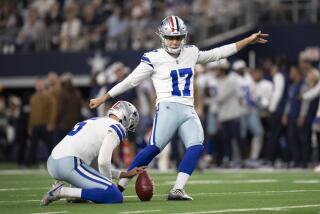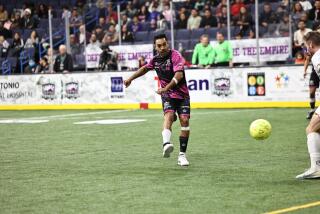McGeough Coming In Loud, Clear : MSL: New Socker is ready to battle for the ball and with his teammates.
- Share via
SAN DIEGO — After four regular-season games and five semifinal games, Jimmy McGeough, pressed into action at the end of the season because of a knee injury to Ben Collins, underwent the final initiation rite in becoming a Socker Thursday during Game 1 of the MSL championship series against the Dallas Sidekicks.
“Did he score a goal?” Coach Ron Newman asked.
Well, no, but he did get into a fight--with teammates, no less.
And he did it with particular flair, first connecting to the face of midfielder Paul Dougherty with an open hand, then being insubordinate with assistant coach Erich Geyer, and finally having to be separated from teammate Wes Wade--all in one quick uprising during the fourth quarter.
Said Dougherty, “He fits into the team really well.”
Because of a proud history of infighting on this club, McGeough’s blow-up rates at most a 7 on a scale of 1 to 10. It pales in comparison to the 1987 Juli Veee-slaps-assistant coach episode, and even to the 1986 Kevin Crow-punches-Cha Cha Namdar incident.
While McGeough gets style points for taking on several team members at once, he rates a big, fat zero for lingering hostilities.
Veee was suspended without pay for a month, and Crow was sued, but none of Thursday night’s participants are even mad now.
“It’s just a situation where your adrenaline is going, you’re into the game, your mind is in it, and somebody says something you don’t want to hear and you just explode,” McGeough said. “But as soon as you get back on the field you just forget about it.”
Even Geyer, the guy whose authority was challenged, didn’t carry a grudge.
“I think it’s good, very healthy, that players can express their emotions like that,” Geyer said. “If you’re on the bench and you get into a fight, it’s no big deal. It doesn’t hurt at all.”
And Dougherty: “It’s an emotional game. Those things happen.”
So what happened? Well, it’s a long story the way McGeough tells it, beginning at 4 a.m. the previous day.
Suffice it to say that at that early hour McGeough learned that his bedroom window can interface with the stereo system of his apartment’s upstairs neighbors, who spent the night partying.
“So I was already tired,” McGeough said, “and in the fourth quarter I was really feeling it. My legs were getting really heavy.”
During this shift, Dallas’ Richard Chinapoo took a pass in the midfield and started dribbling up field. McGeough said he should have put immediate pressure on him.
“But I didn’t push up on him,” McGeough said. “I just didn’t have the legs for it.”
The Sockers were able to break up the attack, and afterward, as McGeough headed toward the bench, Dougherty mentioned to him that there’s no room for losers on the Sockers, only he wasn’t that diplomatic about it.
Suddenly McGeough’s adrenaline wasn’t so sapped, his legs not so heavy.
Not bad for a first-year Socker, especially one who spent his first two months with the team on an unofficial disabled list with knee and ankle problems.
“The lad has come on like gangbusters,” Newman said. “I wondered if I had made a mistake in signing him earlier because we couldn’t get him into the lineup. And then when we finally did get him in there, he was a very pleasant surprise.”
Newman wasn’t speaking about McGeough’s ability to instigate fights, but rather of his ability to instigate counterattacks.
“He’s a brave little devil,” Newman said. “He won’t back off from any sort of tackle. He goes in real hard, and his timing is excellent.”
Said Geyer, “His style of play might not be pretty, but he’s a destructor.”
The good words come as a relief to McGeough, who wasn’t sure he would find a place with the Sockers.
“I was worried because San Diego plays such a different style,” he said. “I wasn’t sure if I could fit in. When I was injured and watching them from the stands all the time, I kept thinking, ‘Well, what am I going to do? What if I get in there and we start losing?’ ”
Call it unfounded paranoia.


